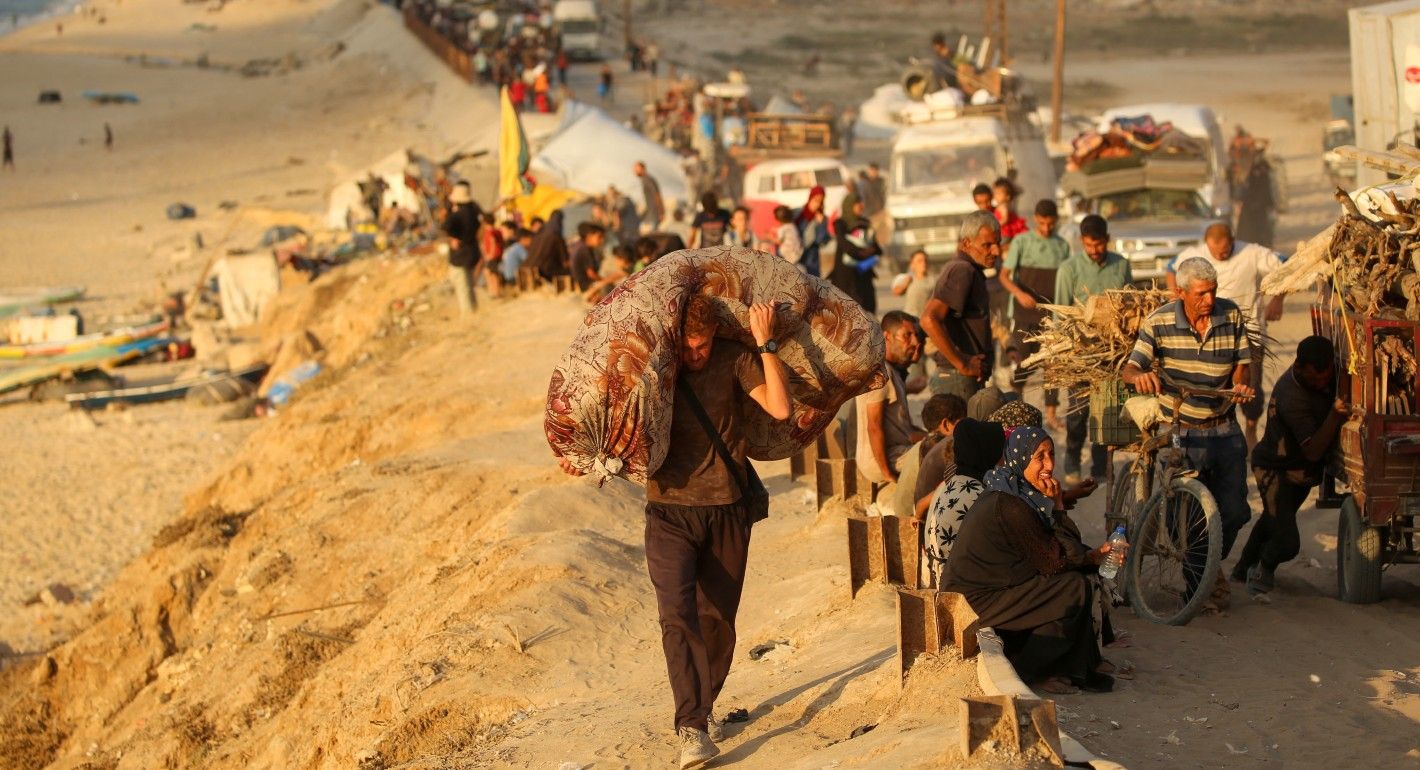The bills differ in minor but meaningful ways, but their overwhelming convergence is key.
Alasdair Phillips-Robins, Scott Singer
{
"authors": [
"Amr Hamzawy"
],
"type": "commentary",
"blog": "Emissary",
"centerAffiliationAll": "dc",
"centers": [
"Carnegie Endowment for International Peace"
],
"englishNewsletterAll": "menaTransitions",
"nonEnglishNewsletterAll": "",
"primaryCenter": "Carnegie Endowment for International Peace",
"programAffiliation": "MEP",
"programs": [
"Middle East"
],
"projects": [],
"regions": [
"United States",
"Palestine",
"Australia",
"Canada",
"United Kingdom",
"Israel",
"France",
"Middle East"
],
"topics": [
"Foreign Policy"
]
}
Displaced Palestinians move southward in the central Gaza Strip on September 24, 2025. (Photo by Eyad Baba/AFP via Getty Images)
The moves neither end the occupation nor halt the war in Gaza. But they do open a diplomatic window of hope and build on a new balance in the international arena.
The recognition of the state of Palestine by Australia, Britain, Canada, and France marks a significant moment in the trajectory of the Palestinian question and in the regional and international politics surrounding it.
After decades of Western hesitation—caught between rhetorical support for the two-state solution and the practical reality of entrenching Israeli occupation of Palestinian territories—this step opens a new window in a political landscape already burdened with wars and crises, particularly amid the war in Gaza, Israeli violations in the West Bank, and tensions along the Lebanese-Israeli and Syrian-Israeli borders.
The significance of recognition lies less in its legal dimension—which does not directly alter the balance of power on the ground—than in the political message it conveys to the international community. Britain and France are founding pillars of the post–World War II international order and permanent members of the UN Security Council, while Australia and Canada are integral parts of the transcontinental Western alliance. Their recognition signals that the so-called Western consensus, which for decades aligned with the U.S.–Israeli position, is gradually eroding.
Diplomatically, recognition inscribes the Palestinian narrative onto the international political map and restores the principle that Israeli occupation is not a permanent destiny and that the Palestinian people hold an inalienable right to self-determination.
Recognition does not halt Israel’s military operations in Gaza, nor does it stop settlement expansion in the West Bank. Yet it undermines the legitimacy of Israeli practices at the international level. Today, Israel’s far-right government finds itself confronting an increasingly critical and oppositional global environment. The diplomatic impunity Israel enjoyed for decades is no longer assured.
Recognition also bolsters the standing of the Palestinian Authority (PA), despite its structural weaknesses, and opens broader avenues for diplomatic presence, whether within the United Nations or in specialized international organizations. This, in turn, enhances the potential for the PA to pursue legal accountability efforts against Israel—though such prospects remain contingent upon the prevailing balance of power in international institutions.
Within the Arab world, recognition provides moral and political support to governments that remain committed to the two-state solution, notably Egypt, Jordan, and Saudi Arabia. Cairo and Amman, which share direct borders with Palestine and bear heavy humanitarian and security costs from the persistence of occupation and for the ongoing war in Gaza, can now credibly argue that the Arab position is neither isolated nor ignored.
At the broader regional level, international recognition of Palestine has also restored diplomacy as a credible arena in the Palestinian-Israeli conflict. It diminishes the ability of Middle Eastern advocates of zero-sum or exclusively military solutions—the Islamic Republic of Iran and its nonstate allies—to claim that they are the sole actors siding with the Palestinian right to self-determination.
Conversely, recognition presents a new dilemma for certain Arab-friendly governments in the Global South that have pursued normalization with Israel and developed strong trade and security ties: How can strong ties with Israel be justified at a moment when international recognition of Palestine as a state under Israeli occupation is growing? This contradiction may compel these states to recalibrate their political rhetoric, even if it does not lead to outright reversal of normalization.
Unsurprisingly, the Israeli reaction to Palestinian recognition was swift and furious. Prime Minister Benjamin Netanyahu’s government labeled the move “an absurd prize for terrorism,” while voices from the far right threatened retaliatory measures. This anger reflects genuine Israeli fears that statehood recognition could foreshadow wider shifts in the international environment, especially if additional European countries such as Belgium and the Netherlands follow suit.
The American position has been more complex. Washington has neither welcomed nor extended recognition, yet it has refrained from openly criticizing its Western allies that have done so. This posture reflects an awareness of America’s diminishing ability to exercise a political veto over international stances on the Palestinian issue. The U.S. administration appears caught between the pressures of pro-Israel lobbies at home and an international reality that is gradually shifting.
Beyond the regional and international dimensions, recognition should be understood within the context of broader transformations in the global system. The world is witnessing the relative decline of U.S. hegemony and the rise of voices from the Global South demanding reform of global governance in Africa, Asia, and Latin America. Western recognition of Palestine indicates that certain centers of power in the Global North are beginning—albeit slowly—to move in directions responsive to Southern demands.
This does not mean that justice is imminent, but it does suggest that the political sanctities that shielded Israel for decades in the West are beginning to erode. The Palestinian question has reemerged as a moral and political benchmark against which the West’s credibility in defending human rights is measured—a moment also defined by war in Ukraine and global crises of energy, climate, and migration.
Yet recognition remains insufficient unless followed by practical measures. Israel continues to control the land, expand settlements, and pursue systematic displacement. Without meaningful international pressure linking recognition to enforcement mechanisms—such as economic sanctions, restrictions on military trade with Israel, or support for international justice pathways—recognition risks remaining more symbolic than operational.
Within the Arab context, much depends on the capacity of governments and civil societies to seize this moment, strengthen the Palestinian negotiating position, and rebuild an Arab consensus that places Palestine at the heart of regional priorities—beyond the divisions and civil wars that have torn apart Arab countries in the Middle East and in North Africa.
This week’s recognition of Palestine neither ends occupation nor halts wars. But it does open a diplomatic and political window of hope and lays the foundation for a new balance in the international arena. It affirms that the Palestinian people exist and that their right to self-determination cannot be erased. At the same time, it calls upon Arab governments, governments in the Global South, and the international community to move beyond symbolism toward meaningful action—toward a just and comprehensive settlement based on securing Palestinians’ legitimate rights, including statehood.
In this sense, recognition represents a step along a long and complex path. It may yet prove to be the move that compels other international actors to reconsider their positions and adopt more equitable policies. In the Middle East, it adds a new layer to the dense web of regional interactions between renewed Palestinian support, escalating Israeli anger but also isolation, divergent Arab responses, and open-ended anticipation of a future still shaped by the balance of power and conflict.
The latest from Carnegie scholars on the world’s most pressing challenges, delivered to your inbox.
Carnegie does not take institutional positions on public policy issues; the views represented herein are those of the author(s) and do not necessarily reflect the views of Carnegie, its staff, or its trustees.
The bills differ in minor but meaningful ways, but their overwhelming convergence is key.

Alasdair Phillips-Robins, Scott Singer
Washington and New Delhi should be proud of their putative deal. But international politics isn’t the domain of unicorns and leprechauns, and collateral damage can’t simply be wished away.

Evan A. Feigenbaum
What happens next can lessen the damage or compound it.

Mariano-Florentino (Tino) Cuéllar
The uprisings showed that foreign military intervention rarely produced democratic breakthroughs.


Amr Hamzawy, Sarah Yerkes
An Armenia-Azerbaijan settlement may be the only realistic test case for making glossy promises a reality.

Garo Paylan